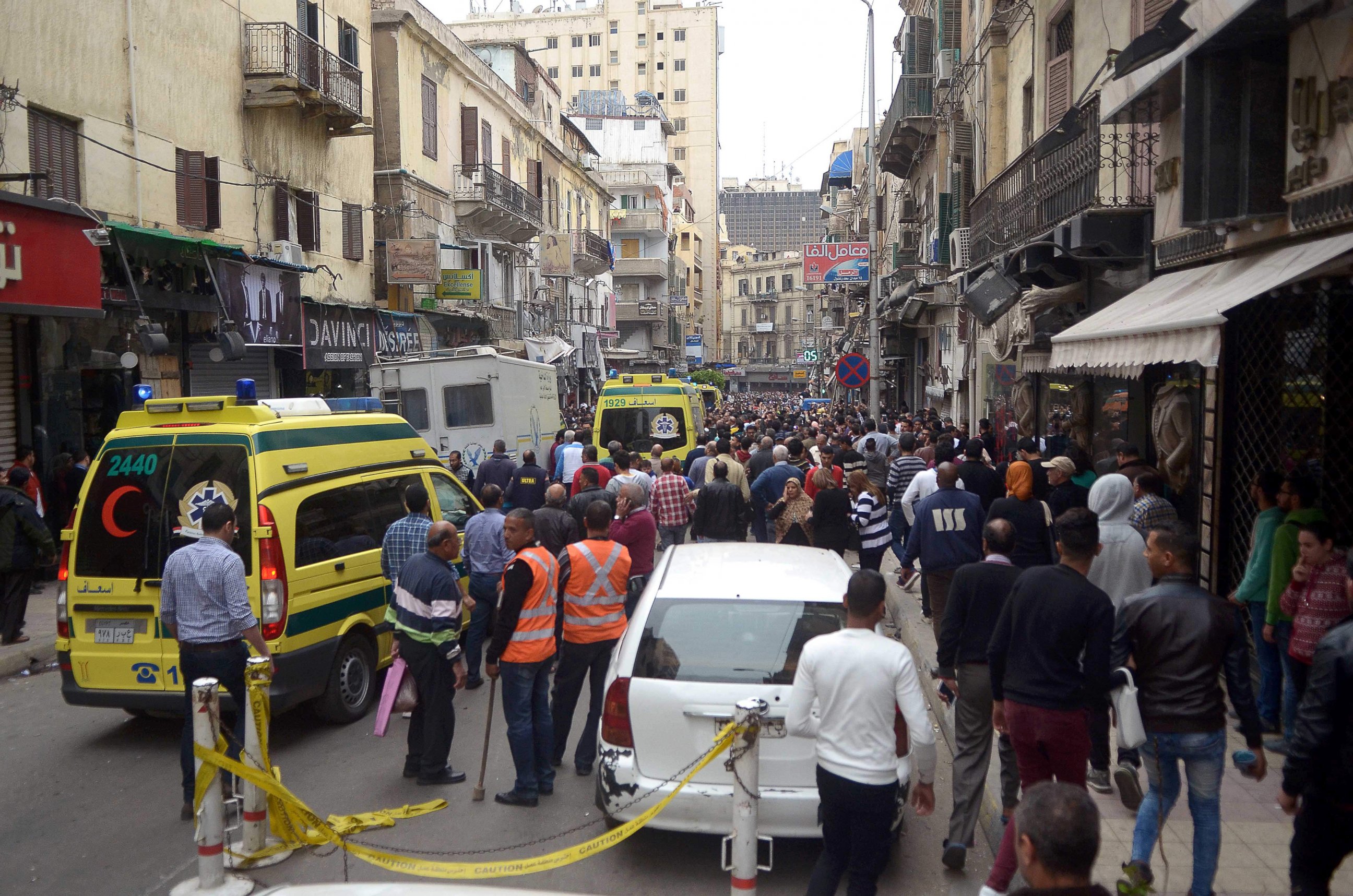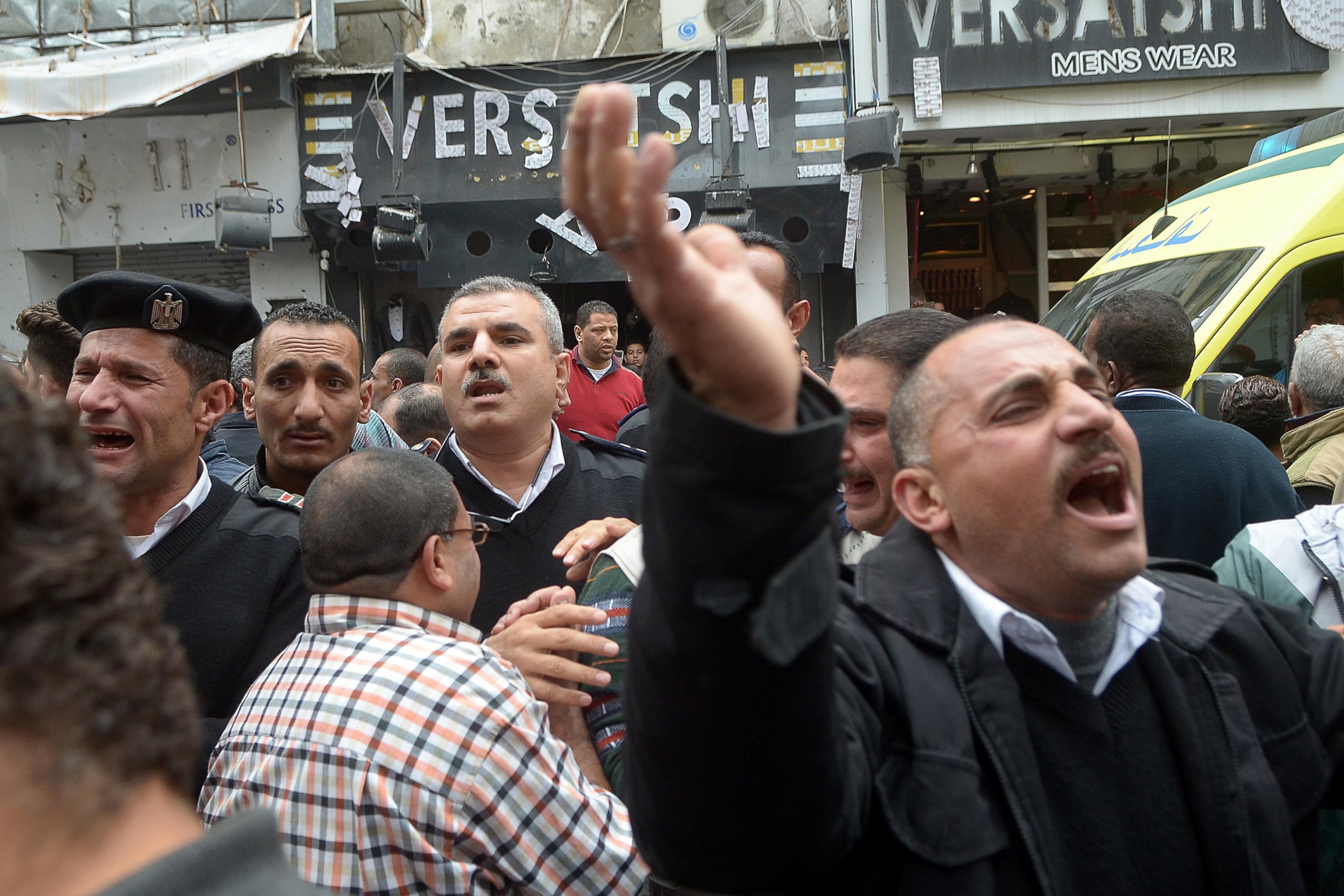Egypt declares state of emergency; ISIS attacks killed scores of Palm Sunday churchgoers
Churches were packed for Palm Sunday when the blasts went off.
— -- Egypt is declaring a state of emergency following twin bomb blasts in churches that were packed for Palm Sunday services.
The state of emergency will last for three months, according to Egyptian President Abdel Fattah el-Sisi.
The attacks, which were claimed by ISIS, follow warnings by the terrorist group that it would escalate attacks on Egypt's Christians, who the CIA estimates make up roughly 10 percent of the country's population.
The two bombings Sunday killed at least 44 people and injured at least 126 others, according to Egyptian officials. The first exploded in a Coptic Christian church in the Nile Delta town of Tanta, and the second several hours later at Saint Mark's Cathedral in the coastal city of Alexandria, the historic seat of Christendom in Egypt.
ISIS claimed that the blasts were the work of suicide bombers who detonated explosive vests at the churches.
President el-Sisi said in an address to his people that security forces would step up their efforts to hunt down those responsible for planning the attacks, and that the media should exercise caution in how they cover the ensuing investigation.

Graphic images including some shared on social media by the Coptic Orthodox Church of Egypt show the horrific aftermath of the twin blasts: Pews are shattered across large swaths of the Mar Girgis Coptic Church in Tanta, where at least 27 people were killed and at least 78 others were wounded. The church floors appear streaked with blood and littered with shredded prayer books.
In Alexandria, where at least 17 people were killed and 48 others wounded, rescue workers at the chaotic scene after the bombing used blankets to carry victims through the debris and to waiting orange emergency vehicles.
The blast at Saint Mark's Cathedral occurred just after the leader of the Coptic Orthodox Church of Alexandria, Pope Tawadros II, finished services, The Associated Press reported. His aides later told local media that he had escaped unharmed.
The bombings came at the start of Holy Week leading up to Easter and just weeks before Pope Francis is due to visit the Arab world's most populous country.
The U.S. embassy in Cairo condemned the attacks in separate statements.
"The U.S. embassy condemns the heinous, reprehensible terrorist attack against peaceful worshippers at Saint George’s Church in Tanta on one of the holiest days of the Christian year," the embassy wrote of the first attack. "Our thoughts and prayers go out to the victims of this horrific attack. We express our deepest condolences to the families and friends of the victims, and we wish the injured a speedy recovery. The United States stands firmly with the Egyptian government and people to defeat terrorism."
The statement about the Alexandria bombing was similar, and both statements pledged solidarity with Egypt against terrorism.
"The United States stands firmly with the Egyptian government and people to defeat terrorism," both statements said.
CBC TV showed footage from inside the church in Tanta, where a large number of people gathered around what appeared to be lifeless, bloody bodies covered with papers. Regional Deputy Health Minister Mohammed Sharshar confirmed the toll from that bombing.
Across the street, neighbor Susan Mikhail, whose apartment has a clear balcony view of the church and its front yard, said the explosion violently shook her building around midmorning, at a time when the church was packed.
"Deacons were the first to run out of the church. Many of them had blood on their white robes," she told the AP. Later, the more seriously wounded started to be brought out, carried in the arms of survivors and ferried to hospitals in private cars, she said.
Pope Francis decried the bombings, expressing "deep condolences to my brother, Pope Tawadros II, the Coptic church and all of the dear Egyptian nation."
Word of the bombings came as Francis himself was marking Palm Sunday in St. Peter's Square.
Grand Sheikh Ahmed el-Tayeb, head of Egypt's Al-Azhar -- the leading center of learning in Sunni Islam -- likewise condemned the violence, calling the events a "despicable terrorist bombing that targeted the lives of innocents."

Israel and the Islamic Hamas movement ruling neighboring Gaza also denounced the bombings.
The explosions add to fears that extremists who have long been battling Egyptian security forces in the Sinai Peninsula are shifting their focus to attacking civilians.
An ISIS affiliate claimed a suicide bombing at a Cairo church in December that killed around 30 people, mostly women. The group also claimed a string of killings in the restive northern Sinai that caused hundreds of Christians to flee to safer areas of the country.
ISIS recently released a video vowing to step up attacks against Christians, whom it describes as "infidels" empowering the West against Muslims.
Egypt has struggled to combat a wave of militancy since the 2013 military overthrow of an elected Islamist president.
The Sinai-based ISIS affiliate has mainly attacked police and soldiers, but has also claimed bombings that killed civilians, including the downing of a Russian passenger plane over the Sinai in 2015, which killed all 224 people on board and devastated Egypt's tourism industry.
Egypt's Copts are one of the oldest Christian communities in the Middle East. They have long complained of discrimination and that the government does not do enough to protect them.
Egyptian media had previously reported that the church in Tanta had been targeted in the past, with a bomb defused there in late March.
The Copts were largely supportive of the military overthrow of Islamist President Mohammed Morsi, and incurred the wrath of many Islamists, who attacked churches and other Christian institutions after his ouster.
ABC News' Ben Gittleson and The Associated Press contributed to this story.




